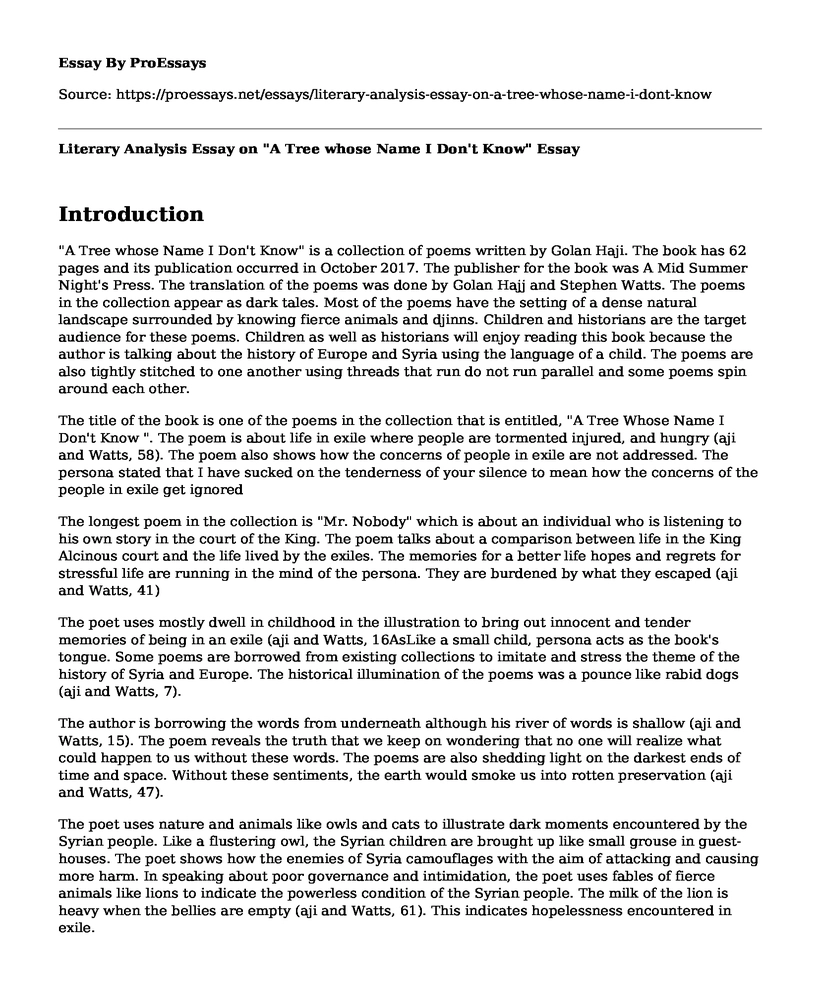Introduction
"A Tree whose Name I Don't Know" is a collection of poems written by Golan Haji. The book has 62 pages and its publication occurred in October 2017. The publisher for the book was A Mid Summer Night's Press. The translation of the poems was done by Golan Hajj and Stephen Watts. The poems in the collection appear as dark tales. Most of the poems have the setting of a dense natural landscape surrounded by knowing fierce animals and djinns. Children and historians are the target audience for these poems. Children as well as historians will enjoy reading this book because the author is talking about the history of Europe and Syria using the language of a child. The poems are also tightly stitched to one another using threads that run do not run parallel and some poems spin around each other.
The title of the book is one of the poems in the collection that is entitled, "A Tree Whose Name I Don't Know ". The poem is about life in exile where people are tormented injured, and hungry (aji and Watts, 58). The poem also shows how the concerns of people in exile are not addressed. The persona stated that I have sucked on the tenderness of your silence to mean how the concerns of the people in exile get ignored
The longest poem in the collection is "Mr. Nobody" which is about an individual who is listening to his own story in the court of the King. The poem talks about a comparison between life in the King Alcinous court and the life lived by the exiles. The memories for a better life hopes and regrets for stressful life are running in the mind of the persona. They are burdened by what they escaped (aji and Watts, 41)
The poet uses mostly dwell in childhood in the illustration to bring out innocent and tender memories of being in an exile (aji and Watts, 16AsLike a small child, persona acts as the book's tongue. Some poems are borrowed from existing collections to imitate and stress the theme of the history of Syria and Europe. The historical illumination of the poems was a pounce like rabid dogs (aji and Watts, 7).
The author is borrowing the words from underneath although his river of words is shallow (aji and Watts, 15). The poem reveals the truth that we keep on wondering that no one will realize what could happen to us without these words. The poems are also shedding light on the darkest ends of time and space. Without these sentiments, the earth would smoke us into rotten preservation (aji and Watts, 47).
The poet uses nature and animals like owls and cats to illustrate dark moments encountered by the Syrian people. Like a flustering owl, the Syrian children are brought up like small grouse in guest-houses. The poet shows how the enemies of Syria camouflages with the aim of attacking and causing more harm. In speaking about poor governance and intimidation, the poet uses fables of fierce animals like lions to indicate the powerless condition of the Syrian people. The milk of the lion is heavy when the bellies are empty (aji and Watts, 61). This indicates hopelessness encountered in exile.
The poet also shows interest in matters of the family as seen in poems such as "The Sleeping Family" (aji and Watts, 50). The poet is mentioning immediate family members in this poem to indicate the loss of loved ones. The persona tries to remember the life of a family and how the brother and mother as immediate family members represent love and care. The persona stated that their mother's tears brushed away like a breeze (aji and Watts, 51).
Works Cited
Hajji, G. and Watts, S. "A Tree Whose Name I Don't Know," 2017. p.1-62.
Cite this page
Literary Analysis Essay on "A Tree whose Name I Don't Know". (2022, Nov 20). Retrieved from https://proessays.net/essays/literary-analysis-essay-on-a-tree-whose-name-i-dont-know
If you are the original author of this essay and no longer wish to have it published on the ProEssays website, please click below to request its removal:
- Home Is So Sad by Philip Larkin - Literary Essay Example
- Translation Analysis of "A Young Man Loves a Maiden" by Heinrich Heine
- Self-Acceptance in Children With Synesthesia: The Girl Who Heard Colors Essay
- Tell-Tale Heart Compares to Scarlet Letter: Literary Analysis Essay
- Analysis of the Song Another Brick in the Wall Paper Example
- Paper Example on Oedipus: A Tale of Determination, Brilliance, and Pride
- Hulga: A Disabled Woman With a Strong Will to Live - Essay Sample







